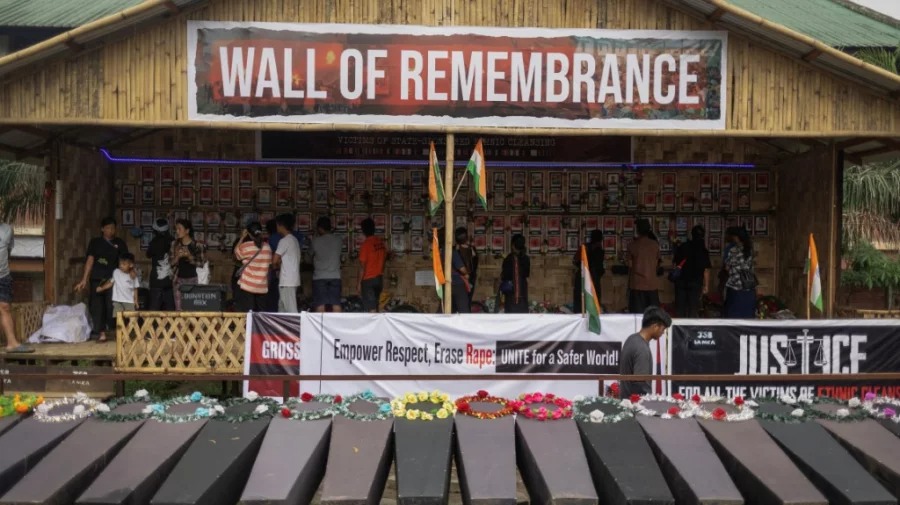Rape used as weapon amid Manipur violence

![]()
News Desk
Kim Khohat, 45, a mother of four and member of the Kuki-Zo ethnic community, still refuses to accept that her 22-year daughter Olivia is dead.
Both Olivia and her friend Florence Hangshing were raped and brutally murdered by marauding mobs on May 5. The women worked as caretakers at a car wash facility in Imphal, the capital of India’s state of Manipur.
The rooms the two were renting were reportedly surrounded by men belonging to the Meitei group. Then, the women were dragged into a different room and assaulted.
“Just a day earlier, I talked to Olivia. She was, in many ways, the bread winner,” Khohat told DW. When she called on the next day, a stranger picked up and asked Khohat if she “wanted to see my daughter dead.”
Khohat lives in a modest home in Kangpokpi, 40 kilometers away from Imphal.
“My daughter’s body is still in the morgue. I have not seen her yet … what do I do? And the police have told me nothing,” adds Khohat, breaking down.
Father of rape victim urges ‘separation’ along ethnic lines
Florence’s father, Amos Paotinthang, a farmer, is more stoic but remains too traumatized to consider carrying out the final rites for his daughter.
Her body also continues to lie unclaimed at the Jawaharlal Nehru Institute of Medical Sciences morgue. Florence had three other sisters.
“I do not want any compensation from the authorities. The only justice I want now is separation from the Meiteis, and that is the only way out. We cannot live together,” Paotinthang told DW.
‘Unprecedented magnitude of violence’
The conflict between mostly Hindu Meiteis and largely Christian Kukis first broke out in May. Over 150 people have been killed and more than 60,000 people have been forced to leave their homes as the army, paramilitary forces and police struggle to quell violence.
However, the outrage escalated last month after a video emerged of a May 4 incident where two Kuki women were stripped naked, raped and forced to parade in front of a group of men from the dominant Meitei tribe in the Thoubal district of Manipur.
Other cases of alleged rape and murder have also been made public, grabbing national and international headlines. Faced with public anger, India’s Supreme Court has stepped in and slammed the state authorities for inaction.
After hearing multiple petitions related to the unrest in Manipur, including documents filed by victims of sexual violence, the court noted that police cases were not registered for nearly three months after the apparent crimes took place. Only few suspects have been arrested.
“We are dealing with something on unprecedented magnitude of violence against women in communal and sectarian violence,” said Chief Justice D. Y. Chandrachud.
On Tuesday, the top court criticized the investigation into the ethnic violence as “lethargic,” expanding its criticism of the authorities in Manipur to say there was “absolute breakdown of law and order and machinery of the state.”
Indian state split in two
The original trigger for the fighting between the two groups was a dispute over tribal rights. The Kukis together with members of another mostly Christian tribe, Naga, account for around 40% of the state’s 3.5 million population. They currently enjoy the scheduled tribe status, which gives them landowning rights in the hills and forests that cover around 75% of Manipur. The Kukis and Naga people objected to proposed plans to extend tribal status to the Meiteis.
But the fault lines have rapidly deepened, and Manipur is now fully divided into two ethnic zones.
Inside Churachandpur, a Kuki-dominated town some 65 kilometres from Imphal, housewife Esther Kongsai told DW she is happy to be alive despite having to flee her home.
“My son and some friends luckily appeared on time when the mobs entered our locality. Some men tried attacking me but somehow escaped. But we lost our house and all possessions,” says Kongsai, who now lives in a camp with 150 other displaced people.
Members of both communities now stay in their territory, though gunfire and sporadic violence continues. So far, the government has been unable to bring the situation under control.
No compromise in sight
In Manipur’s valley country, predominately populated by Meitei, Kukis allege the state government and the police have been abetting Meitei mobs.
In turn, Meiteis living in the hill county accuse the central government and Assam Rifles, a paramilitary force, of going soft on Kuki militants, who are reportedly engaging in poppy cultivation.
As Manipur’s largest community, the Meiteis enjoy huge political and economic advantages and dominate the state government and, in turn, its police force, which many say gives them a lead in the conflict.
Over 250 arrested in Manipur
Police have not officially registered any attacks on Meitei women since the start of the conflict in May. However, some NGOs and activists warn that misinformation has been strategically launched to deepen social rifts and foster violence.
“There were wild rumors that Meitei women were attacked and raped, and that trigger was enough to inflame passions and mob hysteria,” Babloo Loitongbam, director of Human Rights Alert, told DW.
In a report submitted to the Supreme Court, the Manipur state government said it registered over 6.500 reports of possible offenses and that 252 people have been arrested so far. The report includes 11 cases related to violence against women and children. Almost all cases of sexual violence pertain to the Kuki-Zo community.
In turn, the Coordinating Committee on Manipur Integrity (COCOMI), which represents the Meitei people, said unreported attacks on women took place and that many victims had not come forward.